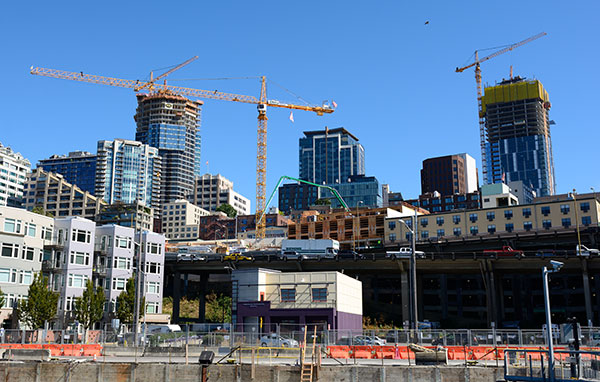Back the Regional Homelessness Authority
Despite all the agencies, resources and commitments geared toward eradicating homelessness in King County, it often appears that no tangible, region-wide progress is being made. An encampment is removed from downtown while another shows up en masse in South Lake Union. For every temporary housing unit built, hundreds more are needed. It appears there is no centralized approach that unites all of King County in one united front to solve the problem.
But that’s about to change.
The King County Regional Homeless Authority was formed in December 2019 to place all efforts to eradicate homelessness under one umbrella. KCRHA will coalesce policy, funding, resources and services with an equity and social justice lens. Most importantly, KCRHA’s work will be guided by the voices of those who experience homelessness, ensuring that solutions are driven by compassion, humility, racial justice, and common sense.
Have not heard of KCRHA? It is not surprising: the COVID pandemic slowed some of its momentum. But the group has continued its behind-the-scenes work, fielding responses from those who experience homelessness who said previous approaches, albeit well-intended, were too fragmented, bureaucratic, and disconnected.
KCRHA also put together its staff, led by Chief Executive Officer Marc Dones, an African American social justice activist and policy strategist with more than 10 years of experience in crafting equitable systems to support marginalized populations. According to PubliCola, Dones helped shape the outlines for KCRHA while serving as a county consultant. Since their appointment in March 2021, KCRHA has engaged community members (and public officials) across the region while tailoring a plan that addresses homelessness by sub-regions, not a county-wide, one-size-fits all approach.
Among KCRHA’s functions:
- It will coordinate all publicly funded outreach, diversion, shelter, rapid re-housing, transitional housing, and permanent supportive housing services and most of the region’s prevention efforts for Seattle, King County and other cities who opt to join its efforts.
- It will provide consolidated, aligned services for individuals, youth, and families in King County who are experiencing homelessness or who are at imminent risk of experiencing homelessness.
- It will coordinate existing services for people experiencing homelessness and design, fund and operate other homelessness and social services using equity and social justice principles.
KCRHA will also create an Ombuds Office to service as a point of contact for the public and establish clear metrics and milestones to ensure success, accountability, and transparency. Already, it has an 11-member Governing Committee that includes Seattle’s mayor, King County’s executive and a member representing those with lived experiences of homelessness.
Funding for KCRHA has come from sources such as the City of Seattle ($73 million in services, $2 million in start-up support) and King County ($55 million in service and administrative work). Additional funding may be available from the U.S. Department of Housing and Urban Development and the American Rescue Plan Act of 2021.
In the coming months, KCRHA will work to begin playing a more visible role in solving the county’s homeless crisis. As an organization working toward a racially just community where people have homes, students graduate and families are financially stable, United Way of King County believes that now is the time to get behind KCRHA’s efforts. A permanent, centralized agency backed by local and county government and guided by voices of those on the ground is the region’s best opportunity to tackle a crisis whose eradication is long overdue.
Let us put them to work and work with them.


Comments
Mike Matusky
November 18, 2021Is anyone up to dealing with the question of "Where does homelessness come from?" I see people and organizations trying to deal with homeless people but who were they the day before they became "homeless"? If we could break the chain of causation there we could probably have an easier job than if we just clean up after the fact.
Replies to Mike Matusky
Catherine Pages
November 18, 2021Mike, I'm with you. I'd like to ask UW's corporate partners what barriers, if any, they post to solidarity organizations like unions whereby folks can leverage their numbers for solutions to poverty, food insecurity, nonresponsive law enforcement and homelessness up front.
United Way of King County
November 18, 2021Hi Mike,
Thank you for reaching out with your thoughtful question. The short answer is that people become homeless for a variety of reasons, the most common are economic; not making enough money to own or rent a place to live and a shortage of affordable housing where they live. Eviction is also leading cause, as is fleeing from domestic violence, a medical crisis and associated bills. The King County Regional Homeless Authority operates an annual Point-in-Time count of people living outside or in emergency shelters and has some data about the reasons people become homeless. In this report on page 31 (it’s the 36th slide in the pdf) you’ll see the most common reasons sighted for people experiencing homelessness from 2017-2020.
At United Way of King County we are focused on preventing homelessness in the first place as a key strategy to fight homelessness. One way we are doing that is to provide families and individuals rental assistance and eviction prevention through our Home Base program. We’re also advocating for the creation of more affordable housing in our region, because we know an individual’s solution for homelessness is to have a home.
Replies to United Way of King County
Todd Schoepflin
November 18, 2021I hope KCRHA will take a broad view and explore all the options.
There is a very stark difference between Bellevue and so-called Freeattle, which are both in KC. I am concerned that KCRHA will simply throw more money at the problem rather than helping people address the root cause issues in their lives. Videos I've found informative include https://youtu.be/iJzIpVB996E and https://youtu.be/8md0LSsVsR4. We must be both compassionate and wise. Decision-makers cannot be naive about real-world human behavior.